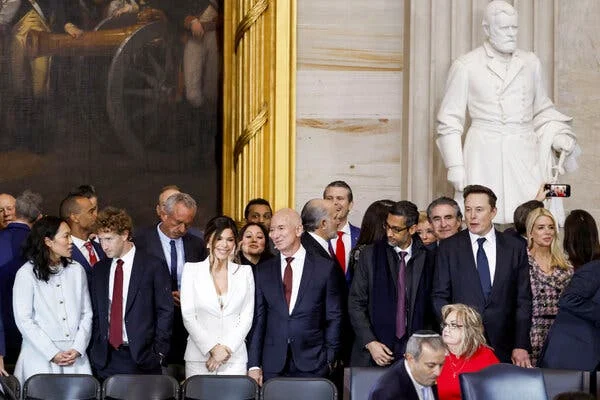
Silicon Valley’s Political Rift: Tech Titans Court Trump While Workers Grow Uneasy
Silicon Valley is renowned for revolutionizing technology, but today its legacy may hinge as much on a rapidly widening political chasm. As some of the most prominent tech leaders—including Elon Musk, Mark Zuckerberg, and Sundar Pichai—have shifted their support to former President Donald Trump, the workforce powering their corporate empires is increasingly disillusioned and uneasy. This divide is reshaping not only business alliances but also the very ethos of the Valley itself.

In San Jose recently, thousands marched in protest of the Trump administration’s policies and the embrace of his leadership by some tech icons. Notably absent from the rally were the usual high-profile executives, a stark contrast to years past when Google’s own co-founder and CEO joined demonstrations against Trump’s immigration restrictions. Now, as tech’s elite court Trump with donations and black-tie events, the rift between the boardroom and rank-and-file employees has never felt greater.
Jeremy Lyons, a longtime Silicon Valley engineer, described witnessing a culture shift: “It’s gone from a nerdy utopia to a money-first, move fast and break things.” This sentiment echoes across the Valley’s workforce, who remember when companies like Google preached “don’t be evil”—a phrase quietly dropped from its code of conduct by 2018 as the sector ballooned into a corporate juggernaut.
Data points to a region in transition. Santa Clara County, the heart of Silicon Valley, swung eight points toward Trump in the last election, yet still remains heavily Democratic, voting 68% for Kamala Harris. Dave Johnson, now leading the Santa Clara GOP, describes conservative gains as merely a shimmer atop a frozen political landscape. The activists and employees, meanwhile, are grappling with a new reality in which fears of wealth consolidation and erosion of democratic checks are running rampant.
The industry’s upper echelon has shifted rightward—with Musk taking an outsized public role and investors like David Sacks helping fundraise for Trump. Mark Zuckerberg, once wary of Trump, shifted after political threats, ultimately donating $1 million to Trump’s inauguration. Yet, as reported, the anticipated regulatory relief from this allegiance has failed to materialize: new tariffs are hammering supply chains, funding for tech research has plummeted, and antitrust action against Meta looms.
This has deepened anxieties among everyday workers. As Dianne Wood, a Silicon Valley startup employee, lamented, “The money is all shifting to the wealthiest, and that terrifies me. Unfortunately, you’ve got the Zuckerbergs and Elon Musks of the world who are taking that over.” Others cite growing distrust: “A lot of employees are very upset by what’s going on. It’s going to be different forever,” said Kamal Ali, who works in AI.
The story of Silicon Valley’s transformation is unfolding not just through the shifting political winds at elite dinners, but in city parks, protest lines, and hushed conversations at startups. As longtime observers note, what once fueled the dreams of changing the world is yielding to a climate of profit, power, and profound uncertainty.
What future lies ahead for the Valley—as its leaders embrace new political calculations and its workforce voices deeper unease? Readers, weigh in: Is innovation being threatened by politics, or is this the next step in Silicon Valley’s ongoing evolution? Share your thoughts in the comments below.